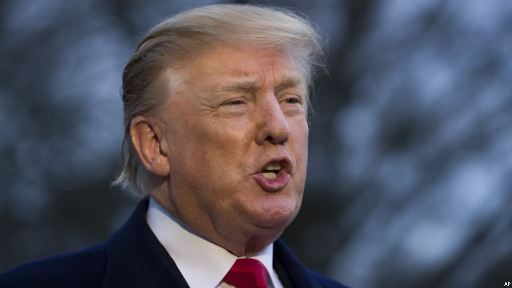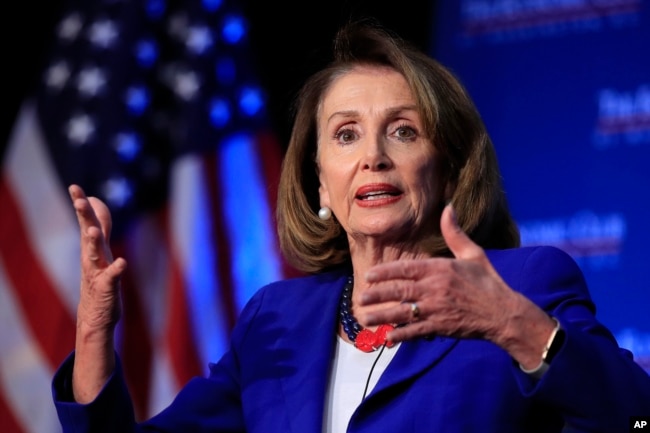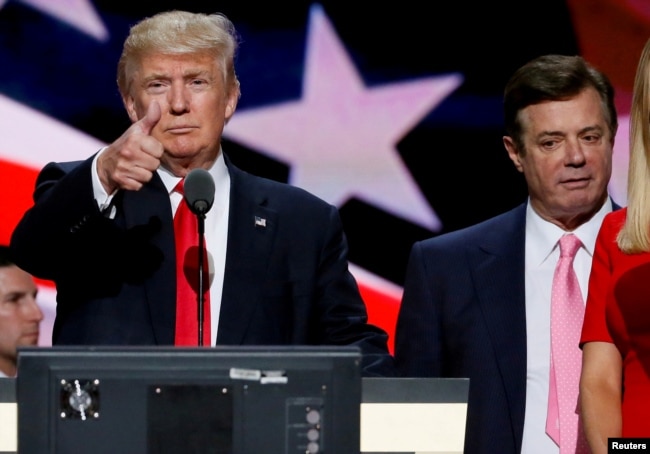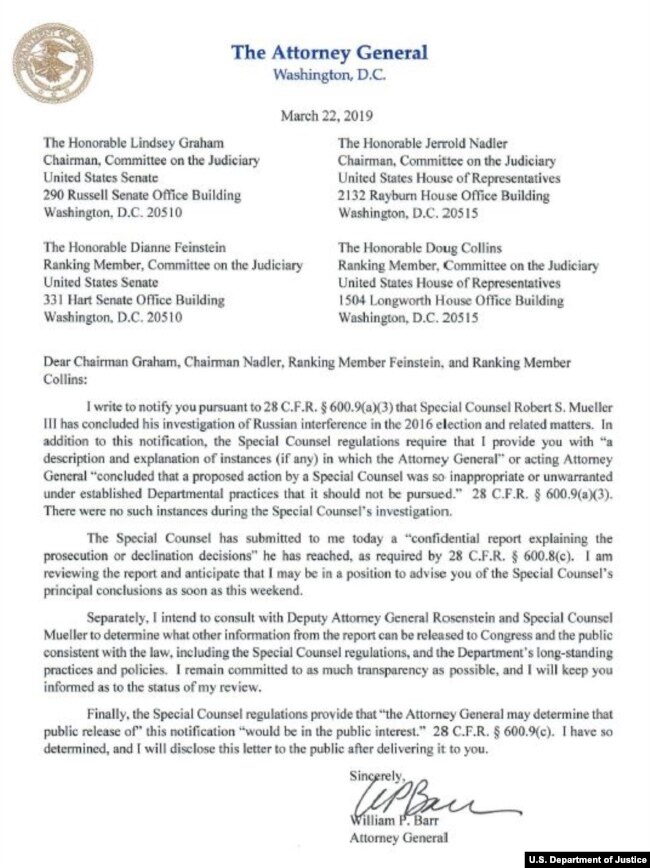
Mueller Vindicates Trump Claim of ‘No Collusion’
VOA NEWS- Masood Farivar
WASHINGTON — In a big legal and political win for U.S. President Donald Trump, Special Counsel Robert Mueller concluded in his final report that there was no evidence that Trump’s 2016 presidential campaign or anyone associated with it colluded with Russia to influence the outcome of the vote, according to a summary of the confidential report released on Sunday by Attorney General William Barr.
That finding was emphatic, and validated Trump’s long-standing insistence that “there was no collusion” between his campaign and Russian hackers and meddlers who sought to change the outcome of Trump’s presidential battle with Democrat Hillary Clinton, the former secretary of state. Using Mueller’s own words, the Barr letter stated that “[T]he investigation did not establish that members of the Trump Campaign conspired or coordinated with the Russian government in its election interference activities.”
But on the question of whether Trump obstructed justice in the course of the investigation, Mueller reached no conclusion and punted the decision to Barr and Deputy Attorney General Rod Rosenstein, according to a letter Barr wrote to top Democrats and Republicans on the House and Senate judiciary committees summarizing the report’s “principal conclusions.” Complicating Mueller’s challenge in getting to the bottom of the question was Trump’s refusal to answer questions under oath and instead provide written answers. Barr and Rosenstein – who appointed Mueller as Special Counsel and oversaw the investigation– concluded that the evidence developed during the investigation “is not sufficient to establish that the President committed an obstruction-of-justice offense.”
That finding is certain to be a key bone of contention for congressional Democrats who are investigating Trump and his administration, especially given the Special Counsel’s assertion that “while this report does not conclude that the President committed a crime, it also does not exonerate him.”
House Speaker Nancy Pelosi, a California Democrat, tweeted that “The fact that Mueller’s report does not exonerate the president on a charge as serious as obstruction of justice demonstrates how urgent it is that the full report & documentation be made public without any further delay.”

Mueller submitted his report to Barr late Friday, nearly two years after he was appointed to investigate allegations of Russian interference in the 2016 election and collusion between the Trump campaign and Moscow.
After combing through the report over the weekend, Barr submitted a four-page letter to Congress absolving Trump of any collusion with the Russians or obstruction of justice in blocking the criminal investigation. Barr’s letter was made public shortly after it was delivered to Congress.
“It was complete and total exoneration,” Trump told reporters in Florida before returning to Washington Sunday afternoon. “This was an illegal takedown that failed and hopefully somebody is going to be looking at their other side.”
Here are five key take-aways from Barr’s summary of the Mueller report:
Trump was right: There was no collusion
The central question before Mueller was whether members of the Trump campaign or any other Americans conspired with Russians to tip the 2016 campaign in favor of the real estate tycoon. On that score, the Mueller report delivers a categorical vindication of the president.
While Mueller’s investigators uncovered evidence of Russian meddling in the U.S. election, “[the] investigation did not establish that members of the Trump campaign conspired or coordinated with the Russian government in its election interference activities,” the summary quotes Mueller as writing.

The special counsel interpreted «coordination» fairly broadly to include both tacit and express agreements.But he found no evidence that members of the Trump campaign accepted offers of help from Russian operatives. “There was really an affirmative ‘No’» said Eric Jaso, a former associate special counsel for the Whitewater affair during former President Bill Clinton’s administration and now a partner at the Spiro Harrison law firm.“If they’d gone along and said yes, that would have fallen under the tacit agreement category.”
Mueller punts obstruction of justice question
Mueller’s decision to punt the question of obstruction of justice struck many legal experts as unusual.
The Special Counsel took up the question after Trump fired FBI Director James Comey over the Russia investigation and after Comey claimed that Trump had asked him to stop investigating his former national security advisor, Michael Flynn.
But Mueller drew no conclusion about whether Trump’s actions during the investigation amounted to obstruction of justice, according to the Barr summary.
“Instead, for each one of the relevant actions investigated, the report sets out evidence on both sides of the question and leaves unresolved what the Special Counsel views as ‘difficult issues’ of” whether Trump obstructed justice, Barr wrote.
With Mueller leaving the matter unresolved, it was left to the attorney general to make a determination. Barr wrote that after consulting with Justice Department officials, he and Rosenstein concluded that there was not enough evidence that Trump had committed obstruction of justice. The determination, he added, was made irrespective of a long-standing Justice Department guidance that a sitting president can’t be indicted.

Before taking the helm of the Justice Department last month, Barr had written critically of the Mueller probe and called the investigation of Trump for possible obstruction of justice “fatally flawed.”
Rep. Jerry Nadler (D-NY), chairman of the House Judiciary Committee, called the decision “concerning” and said he’ll ask Barr to testify before the panel in the near future.
Jaso said the fact that Barr made the determination in concert with Rosenstein provides Barr with political cover.
“He can’t be just painted as a toady of the president,” Jaso said.
No additional indictments
The Special Counsel investigation led to the indictments of 37 individuals and entities, mostly Russian operatives and a handful of former Trump associates. In the run-up to the Mueller report, speculation was rife that the Special Counsel would announce new indictments against individuals in the president’s orbit.
But Barr’s summary says the Special Counsel does not recommend any additional indictments in his report and says that there are no indictments under seal that have yet to be made public.
A redacted version in the works
The full extent of Mueller’s findings, including evidence concerning obstruction of justice, will remain unknowable until a more complete version of the report is released. In his letter, Barr indicated that he’ll share a redacted version of the full report at a future date.Barr said that he’s asked the Special Counsel to identify confidential information that must be kept classified and that as soon as “that process is complete, I will be in a position to move forward expeditiously in determining” what can be released. Democrats are demanding full disclosure and vowing to compel the attorney general to comply.
Thorough investigation
Defenders of the Mueller investigation found a measure of vindication in the thoroughness with which the veteran prosecutor and former FBI director carried out the probe. According to Barr’s letter, the Special Counsel issued more than 2,800 subpoenas, executed nearly 500 search warrants, obtained more than 230 orders for communication records, made 13 requests to foreign governments for evidence and interviewed approximately 500 witnesses.
By all accounts, Mueller left no stones untouched in his dogged effort to probe whether the Trump campaign colluded with Moscow and whether the president sought to impede the investigation that followed.
But Mueller appears to have steered clear of one line of inquiry that the president had said was off limits: Trump’s finances and whether the president’s business interests in Russia led him and his campaign into collusion.
“It does not say that thirdly or furthermore we investigated whether the Trump campaign or Trump himself had a desire to ingratiate himself with the Russians which somehow made him vulnerable to this effort,” Jaso said.

